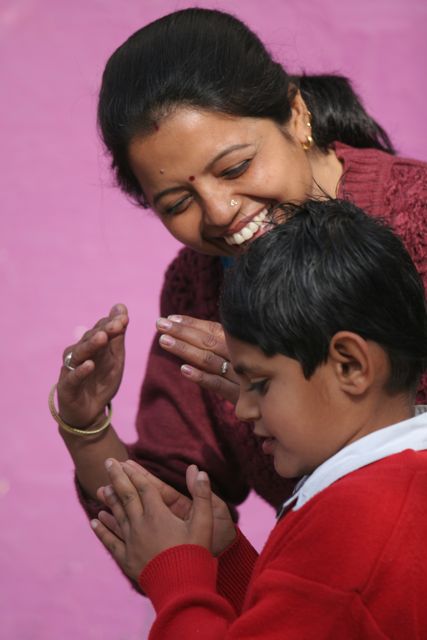The history of disability is a history of courage. How could it be otherwise? People accustomed to living on the margins of society have less to lose than most. They notice more and they are more accustomed to hardship than ordinary people.
Natalia Dmytruk didn’t set out to be a revolutionary. The child of two deaf parents, she grew up with sign language as her mother tongue. That knowledge led her naturally and inevitably to her chosen career as a sign language interpreter – eventually becoming the official interpreter for the state-run national television news broadcast in the Ukraine. 
Tough job! Ukraine, in the beginning of this century, was not a place for creativity or personal interpretation of the news or anything else and Natalia was inured to the demands of her job: just sign whatever the guy at the desk is saying. Don’t second-guess him; don’t question what he’s saying; in fact, don’t question anything. Just the facts, ma’am. (Or whatever facts have been selected for public consumption.)
Except for one thing.
Natalia had two children – a teenager and a 20-year-old. They were deeply involved in the opposition movement in the Ukraine, protesting the Russian-backed ruling regime and agitating for free elections. She accompanied them to a few political demonstrations. “I was impressed by the expression on my children’s faces. I was so fired up by other people I observed passionately voicing their discontent,” she said in an interview. “It was that special spirit and energy of people coming together, uneasily at first, but looking in the same direction.”
Yet every day, Natalia would turn up at the television studio where she worked and obediently interpret the state’s version of the news, even though she now knew it to be a spider’s web of lies and deception. “I was observing it from both sides, and I had a very negative feeling,” she said. “After every broadcast I had to render in sign language, I felt dirty. I wanted to wash my hands.”
One day, it all got to be too much. The elections had been held on November 21, 2004 and on November 25th, Natalia decided to act. “I was observing it from both sides, and I had a very negative feeling,” she said. “After every broadcast I had to render in sign language, I felt dirty. I wanted to wash my hands.”
 The newsreader announced that the elections had returned Viktor Yanukovych to power. Rather than cooperate with the state’s fiction, Natalia told her deaf community the truth: “I am addressing everybody who is deaf in the Ukraine. Our president is Victor Yushchenko. Do not trust the results of the central election committee. They are all lies. . . . And I am very ashamed to translate such lies to you. ”
The newsreader announced that the elections had returned Viktor Yanukovych to power. Rather than cooperate with the state’s fiction, Natalia told her deaf community the truth: “I am addressing everybody who is deaf in the Ukraine. Our president is Victor Yushchenko. Do not trust the results of the central election committee. They are all lies. . . . And I am very ashamed to translate such lies to you. ”
Natalia’s courage sparked a wave of outrage. Deaf people spread the word – in writing, in sign. Journalists across the country walked out of newsrooms, news-stations and radio towers. The national press shut down as journalists refused to report the official story. Eventually, the Supreme Court declared the elections invalid and mandated new ones. Victor Yushchenko was declared president of the Ukraine and Natalia Dmytruk proved once again the power of silence, the power of speaking out and the power of courage.
Inclusion works miracles. The history of disability is the history of an improbable truth: weakness can be strength. Silence can be deafening. And the truth shall set us all free.


